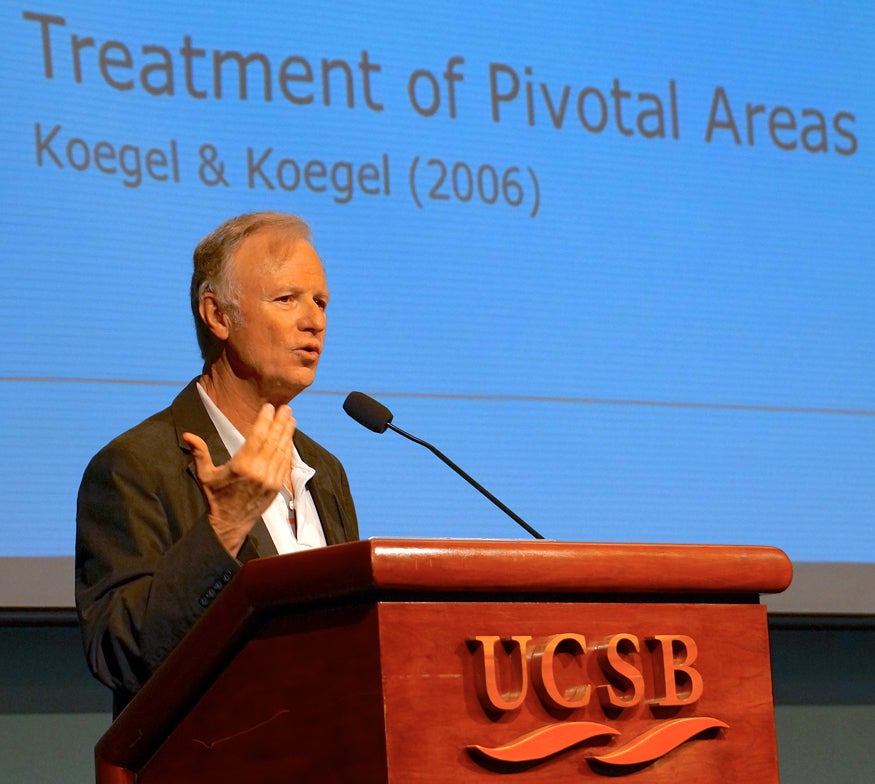
Hundreds of autism experts from around the world gathered at UC Santa Barbara today for the 6th Annual International Pivotal Response Treatment (PRT) Autism and Asperger's Conference.
Sponsored by UCSB's Koegel Autism Center, the two-day conference at Corwin Pavilion features scholars, educators, health care professionals, parents, and even grandparents discussing autism, Asperger's syndrome, and cutting-edge intervention and treatments strategies.
According to Lynn Kern Koegel, clinical director of the Koegel Autism Center and the Broad Asperger Center, and one of two keynote speakers, the main focus of this year's conference is PRT and the associated techniques for treating every aspect of autism spectrum disorder –– from first words, to socialization, to social conversation –– across all age levels, from infants to adults.
The conference began with Robert Koegel, director of the Koegel Autism Center and the second keynote speaker, providing an overview of PRT. Developed at UCSB, PRT is a protocol based on principles of positive motivation. Researchers have found that increasing children's participation in activities they enjoy can actually lessen the severity of autism spectrum disorder symptoms and open the door to more positive social interaction. Their work with infants was highlighted in the April issue of the Journal of Positive Behavioral Interventions.
The idea, Robert Koegel said, is to focus on pivotal areas that cause widespread change in function, instead of treating "one behavior at a time, which would take forever." He also pointed out that while some 850 protocols have been identified for treating autism, only a handful –– including PRT –– have the recognized empirical evidence to support them.
Robert Koegel also discussed new studies being conducted by researchers at the center, including work with the California Department of Rehabilitation to help identify ways adults with autism can become successfully employed.
Following Robert Koegel's overview, Ty Vernon, director of the Koegel Autism Center Assessment Clinic, led a session that focused on the nuts and bolts of PRT, or as they say at the center, the ABC's –– antecedent, behavior, and consequence. Clinicians at the center use PRT to advance language acquisition in children with autism, although, as Vernon pointed out, the treatment protocol is effective with other behaviors as well.
The antecedent represents the task the child is asked to complete –– to say the word "doll," for example. The behavior is the child's attempt. It may consist simply of the sound "da," but it is a positive response. The consequence, then, is the parent or clinician handing the doll to the child.
The goal of the process, Vernon said, is to help these children "become independent, active agents in their environments."
The conference continued with Lynn Koegel discussing the importance of early intervention with PRT, noting a 95 percent success rate when they begin with nonverbal children under the age of 3. Between 3 and 5, the success rate drops to between 85 and 90 percent, she said, and after 5 it plummets to about 20 percent.
She also highlighted the importance of teaching children with autism how to initiate communication. "Autistic kids aren't creating their own learning opportunities," she said. They use language for requests and protests, she continued, but not for question functions.
A variety of workshops and breakout sessions are part of the conference, with other speakers, including Grace Gengoux, clinical assistant professor at Stanford University's Autism and Developmental Disabilities Research Program; Areva Martin, an attorney and author who will speak on special education advocacy issues; and Amber Bharoocha Walz, a doctoral student at UCSB whose area of emphasis is special education disabilities and risk studies.
The conference continues through Friday afternoon, September 20. Additional information, including a complete schedule, is available at http://www.education.ucsb.edu/autism.
Related Links



